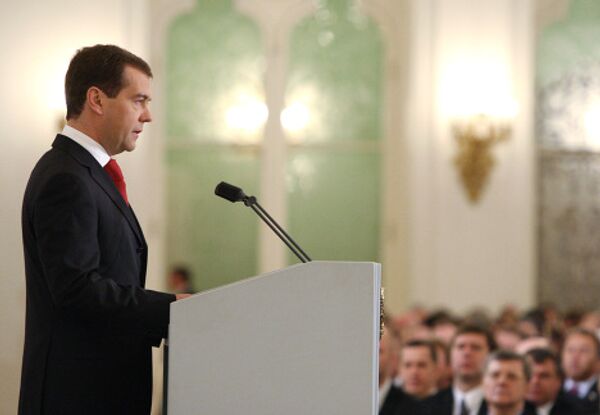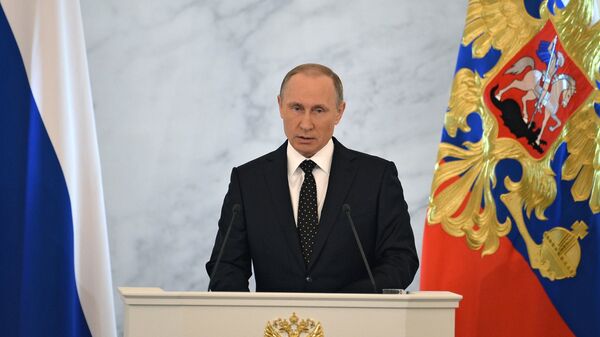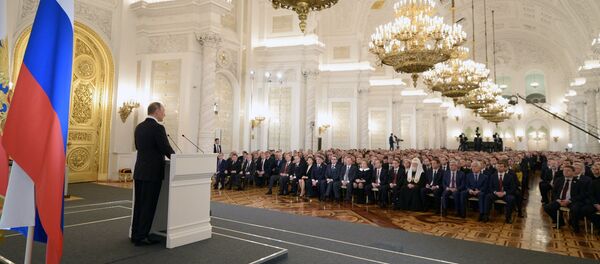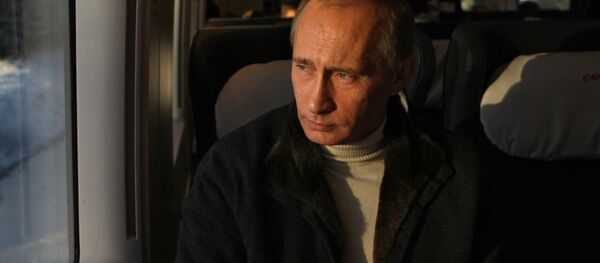MOSCOW (Sputnik) — The presidential address is traditionally attended by members of both houses of the Federal Assembly, as well as distinguished guests. Cabinet members, the chairmen of the Constitutional and Supreme Courts, the prosecutor general, the chairman of the Central Electoral Commission, the head of the Accounting Chamber, members of the State Council, the leaders of the country’s main religions, and representatives of the Russian Civil Chamber are also invited to the Kremlin.
Lasting about an hour, the address was traditionally given in the Kremlin’s Marble Hall, built in 1982.
In 2008, President Dmitry Medvedev moved the location of the address to the more spacious St. George’s Hall of the Grand Kremlin Palace, as befitted the significance of the event.
The first address to the Federal Assembly, entitled "On the Consolidation of the Russian State (the main directions of domestic and foreign policy)," was delivered by Russian President Boris Yeltsin on February 24, 1994.
The theme of the speech was building a state based on rule of law, respect for the Constitution and laws, protecting citizens’ rights in a democratic society, the integrity of the state and regional policy, and market reforms. One of the president’s central ideas was that Russia could neither afford to return to the planned economy of the Soviet era nor continue inflicting "shock therapy" on the economy.
President Yeltsin’s address to the Federal Assembly on February 16, 1995 was entitled, "On the Efficacy of State Power in Russia," and focused on Russia’s sovereignty, independence, integrity and economic potential, as well as federalism and local self-government, the state’s right to use force in the Chechen crisis, Russia’s foreign policy priorities, ensuring citizens’ rights and freedoms across the country, support for science, culture, and education, and relations between the media and government.
On February 23, 1996, in his annual address, entitled "Responsible for Russia," President Yeltsin discussed the development of the country and Russian society. The head of state noted that after four years of reforms, "Russia’s disintegration was prevented and the specter of civil war was dispersed; the constitutional foundations of the Russian state based on the rule of law were laid; movement began toward the establishment of a genuine federal state organization and toward a fitting role for Russia in the international community; and the foundations of a market economy were laid. For the first time in Russian history, wide-ranging transformations are being effected without the suppression or elimination of political opponents."
President Yeltsin’s address to the Federal Assembly on March 6, 1997 was entitled "Order in the Government, Order in the Country." The president called for the enforcement of order in the government and the country as a whole on the basis not of dictatorship but rule of law. Yeltsin stressed that order in the country starts with order in the government, and that the most valuable resource in this respect is "the energetic completion of the economic, social, and legal reforms." The president acknowledged that the country’s top political leadership had made mistakes in its handling of Chechnya, resulting in heavy casualties and significant economic damage. He reiterated Russia’s disapproval of NATO’s eastward expansion plans and said that Europe was entering "critical times." The president defined the ultimate goal of Russia’s military reform as the creation of adequate national defense and leaner, but more effective armed forces. He also outlined military reform priorities.
The president’s central message was the need to revitalize Russia through joint efforts of all of its regions. The head of state stressed that Russia should be not a political battlefield, but a place of civic unity and harmony, and cooperation between the executive and legislative branches of government. The president devoted considerable attention to the country’s economic problems. He set the Russian government the task of accelerating the drafting of next year’s budget. The address also gave high priority to social issues: Yeltsin focused on healthcare, the physical and moral condition of Russia’s youth, culture, and the needs of the armed forces.
President Yeltsin’s annual address to the Federal Assembly on March 30, 1999 was entitled "Russia Between Two Epochs." For the first time, the Russian leader started his speech not with domestic issues, but the situation in Yugoslavia, noting that his address came "at a dramatic moment" as NATO conducted airstrikes on Yugoslavia. "I will do all I can to bring about a rapid end to the military operations," the president vowed. At the same time he stressed that Russia will not allow itself "to be dragged into an armed conflict." The main theme of the presidential address was the current situation in the country and the outlook for its development. President Yeltsin placed special emphasis on the following issues: defending citizens’ rights and freedoms, holding free and democratic elections, preventing criminal elements from entering the government, the performance of the future parliament, the vested interest of all strata of society without exception in Russia’s prosperity, and the need to combine command and market methods of economic management. The president vowed to revive the fight against various perks and privileges.
On July 8, 2000, Russia’s new president at that time, Vladimir Putin, made his first annual address to the Russian Federal Assembly, "The State of Russia: A Path toward an Effective State."
In his first policy speech, President Putin declared the need to transform Russia into a strong and effective state. He clearly outlined the main threats to Russian society: its ageing demographic, the physical and spiritual decay of the nation; economic problems, including the growing gap between Russia and the leading western economies, threats to Russian federalism, primarily regional separatism, poor local governance, the absence of a unified, effective vertical chain of command in the state, and the lack of interaction between its various elements. The president affirmed that press freedom had always been and remained a fundamental principle of Russian democracy. In his address, Putin also brought up a number of other important subjects related to social issues, government, domestic politics and foreign policy.
On April 3, 2001, Putin made his second annual state-of-the-nation address, this time focusing on socioeconomic issues. He discussed the progress made since the previous year’s address, outlined a broad range of solutions to problems in all spheres of Russian society and defined priorities for the development of the state in the next year. Putin underscored the need to restore a system of governance in the country with a clear-cut division of powers between federal and regional governments, and a gradual reduction of state intrusion into the lives of citizens. He called for decisive action to make Russia’s legal system transparent, simple and predictable, to reduce the state’s intervention as an arbiter and guarantee property rights. His speech expressed the Russian leadership’s commitment not to pursue any attempts to redistribute property and to ensure that corporations pay taxes in accordance with laws and are transparent in their financial activities.
On April 18, 2002, in the Kremlin’s Marble Hall, Putin delivered his annual address to the Federal Assembly, the central theme of which was enhancing Russia’s global competitiveness.
The president devoted the bulk of the speech to economic and social issues. Putin again harshly criticized the government for the country’s low economic growth. The government was instructed to submit proposals on restructuring the state apparatus. He spoke about the need to continue military reforms and transition to a professional army, complete the military phase of the operation in Chechnya, continue government administration reforms and eradicate poverty in the country. "We should make Russia a prosperous and affluent country so that life here is safe and comfortable," the head of state said, concluding his speech.
The following year’s speech took place on May 16, 2003. The country’s new priority, he said, was to ensure its place among the world’s powerful, economically advanced and influential states in the near future.
Addressing the country’s imperfect economic and political systems, Putin called for a drastic reduction in the functions of government agencies. The president also held out the possibility of taking parliamentary election results into account when forming the government. Putin also set the goal of doubling the country’s GDP within the next 10 years and making the ruble fully convertible. The head of state pledged to finalize the political settlement in Chechnya. He also said the transition to professional combat-ready army should be completed in 2007 and that the term of compulsory military service should be reduced to one year from 2008.
On April 25, 2005, Putin’s annual address to the Federal Assembly began with an overview of Russian modern history. The president then stated his position on a number of issues ranging from corruption of officials and the powers of fiscal agencies to raising public sector wages and boosting investment in the Russian economy. The president identified the country’s main goal as building an effective state within existing borders and the consolidation of the Russian Federation.
On May 10, 2006, top Russian Civic Chamber officials were invited to the annual speech for the first time.
The president cited demographics as Russia’s most urgent problem and proposed a path forward: reducing mortality, improving migration policy and increasing the birth rate. Among the national security priorities the president addressed were Russia’s preparedness to counter external threats and terrorism, strengthening the nuclear nonproliferation regime and Russia’s admission to the World Trade Organization. Speaking about the state of Russian society, the president highlighted the low public trust in the government and big business. The president reaffirmed that the government would seek to enhance the prestige of the civil service while also supporting the Russian business community.
Putin’s address on April 26, 2007 was devoted to his plan for Russia’s comprehensive modernization in the 21st century. It set clear national priorities: increasing the country’s prosperity and pension reforms built on the principle of co-financing, defining the mechanisms for their implementation and sources of funding.
The speech also touched on the spiritual and cultural unity of Russian citizens, patriotism and loyalty to the Motherland. The president emphasized the need to toughen penalties for extremist actions.
In the foreign policy sphere, the highlight of the address was the president’s announcement that Russia would suspend its implementation of the Treaty on Conventional Armed Forces in Europe, or CFE Treaty. Putin attributed the decision to the fact that NATO countries had not ratified the treaty adopted in 1999. The moratorium, he said, would remain in force until all NATO countries without exception ratify the treaty and strictly adhered to it. Putin vowed to withdraw from the CFE Treaty if there is "lack of progress at negotiations."
On November 5, 2008, Russian President Dmitry Medvedev made his first address to the Federal Assembly, which prioritized defense and security issues, anti-crisis measures, and the fight against corruption. Medvedev also advocated making Russia a leading international financial center, and proposed reforms of the country’s political system.
Medvedev proposed extending presidential and parliamentary terms from four to six and five years, respectively. The president proposed guaranteeing parliamentary seats to parties that receive 5-7 percent of the electoral vote, ending the use of the monetary deposit in elections at all levels, and the possibility of gradually reducing the number of voters’ signatures required to run for office. President Medvedev proposed that candidates for heads of Russian regions only be submitted by the winning parties in regional elections, and that the Federation Council be formed only from citizens elected to regional legislatures, while the Federal Assembly’s powers should be expanded to executive branch oversight.
On November 12, 2009, Russian President Dmitry Medvedev made his second annual address to the Federal Assembly. He devoted the first and greater part of his address to the economy, specifically its long-term prospects. His central argument was that structural reforms could not be delayed any longer. President Medvedev raised a number of issues related to the country’s judicial system. He spoke about the implications of creating appeal boards at courts of general jurisdiction. Medvedev devoted special attention to the fight against corruption and the effective application of criminal law.

The president proposed introducing regular reports by governors to local legislatures, defining criteria for the number of regional MPs, and unifying early voting procedures for local elections. The president made a number of surprise proposals such as reducing the number of time zones in Russia and abandoning daylight savings time.
President Medvedev proposed creating a Russian version of Silicon Valley. His second address differed from all previous presidential addresses in the method of its preparation. For the first time the head of state involved the public in the discussion.
On November 30, 2010, President Medvedev used his annual address to take on the most vexing issues in Russian society, namely bribery, falsification in government procurement orders, and bureaucratic red tape in the provision of government services.
The decision to reduce insurance contributions for small businesses in manufacturing and social sectors from 34 percent to 26 percent for two years was one of the most important new policies for the business community.
But modernization remained the top economic priority. The president directed the government to put no less than half of budget savings and part of surplus federal budget revenues toward modernization programs. Furthermore, he said, regional and municipal authorities should privatize non-core assets.
The speech also addressed issues such as the conflict between environmentalists and construction companies over the Khimki forest, inaction by officials and the ruthless killings in the village of Kushchevskaya, the vulnerability of orphans, neglected and abandoned children, rising crime against children, the catastrophic shortage of kindergartens, and assistance for multi-child families. In particular, the president proposed providing large families with plots of land.
Dmitry Medvedev’s fourth state of the nation address to parliament was made on December 22, 2011.
The president set out plans for wide-ranging reforms of the political system. One of his main proposals was transitioning to direct elections for heads of Russian regions.
The head of state also made a number of proposals concerning changes in parliamentary elections and the registration of presidential candidates. In particular, Medvedev proposed ending the requirement of collecting signatures to run for the State Duma and regional legislatures. Furthermore, the head of state suggested changing the parliamentary election system and introducing proportional representation in 225 districts. Medvedev also proposed moving to a simplified party registration procedure and expanding the rights of political parties in election commissions.
The presidential address also highlighted the need to stay the course on decentralizing power and expanding the rights of regions.
The president also suggested creating public television in Russia.
On December 12, 2012, President Vladimir Putin made his annual address to the Federal Assembly for the ninth time after beginning his third term as president, but this was the first time after the presidential term was extended to six years. In the speech, the president discussed the country’s long-term development prospects.
Within four or five years, he said, Russia should become completely self-sufficient for food staples and ultimately become a leading food producer. The head of state also called for road construction to at least double within the next decade and for a nationwide unified transit network to be established.
Putin urged parliament to approve restrictions on government officials and politicians owning real estate, bank accounts, and securities abroad. According to the president, civil servants should declare foreign property holdings in their tax returns and explain the origin of funds used to purchase them. Putin entrusted the government with developing a system to pull the Russian economy out of offshore zones. The address outlined the goals of expanding the middle class with qualified public-sector employees, creating an investment roadmap for Russia, and curbing unskilled workers.
Putin devoted special attention to public education, public sector wages, and Russia’s demographic challenges. He identified population stability as one of the key achievements of the country’s social policy, and said that a family with three children should become the norm in Russia.
On December 12, 2013, President Putin gave his annual address to the Federal Assembly, coinciding with the 20th anniversary of the Constitution of the Russian Federation, which was adopted on December 12, 1993 in a popular referendum. In his address, President Putin outlined the country’s domestic and foreign policy priorities.
He reaffirmed the government’s policy of "de-offshorizing" the national economy and proposed a number of tough measures to move from words to action on this front. The president also raised issues of local government reform, public oversight, banking regulation, public education, interethnic harmony, and migrant labor, among others.
On December 4, 2014, Putin spoke in his address of the economic situation and anti-Russia sanctions. He urged to lift restrictions for business, suggested total amnesty for capital returning into Russia, called for reversal of economy’s zero growth and stabilization of the country’s banking system.
The president suggested that the United States always influenced Russia's relations with neighbors, while the western sanctions were imposed to counter Russia’s influence and not over the crisis in Ukraine. He called the sanctions a driver for the country's efficient development.
On December 3, 2015, Putin focused on the Russian anti-terrorist military campaign in Syria in his annual state-of-the-nation address before the country's parliament. He thanked the Russian servicemen fighting terrorism in Syria and warned of increasing global terrorism.
Putin also reiterated Russia’s call to the international community to create a unified counterterrorism front with actions based in international law. He pointed out every state’s obligation to contribute to defeating terrorism.







